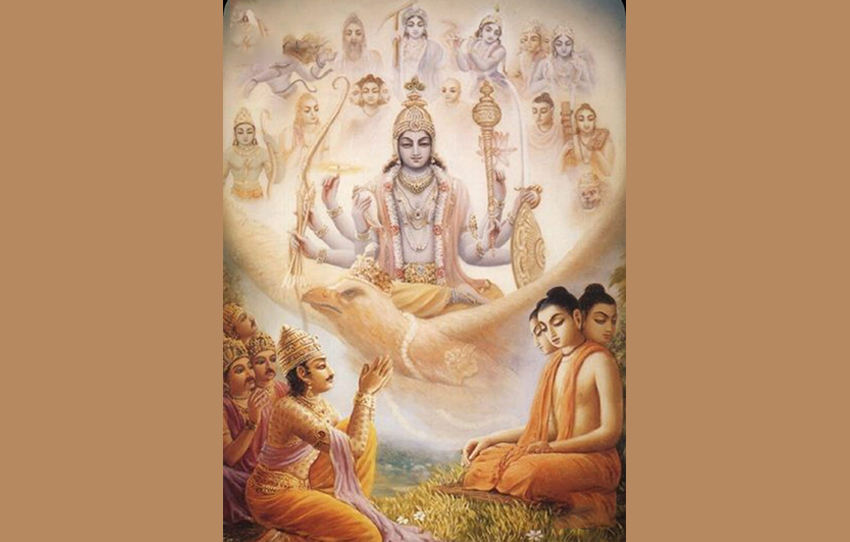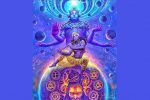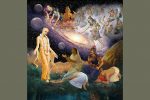NAME 31
Saṁbhavaḥ संभवः
He incarnates to destroy the evil forces that act as deterrent factors to uphold dharma. His incarnations happen only out His free will.
Free will of the Brahman is different from the free will of human. Free will of the Brahman is His own power of autonomy that nobody else possesses. The entire universe is the manifestation of His free will. Human free will is his capacity to take decisions on his own uninfluenced by external agencies. The right choice of freewill liberates a man. The option before a man is either to be with Brahman’s creation or with the Brahman and the latter leads to liberation of soul.
Kṛṣṇa explains the necessity for His incarnations in Bhagavad Gita (IV.8).
paritrāṇāyasādhūnāṁvināśāya ca duṣkṛtām |
dharmasaṁthāpanārthāyasambhavāmiyugeyuge ||
परित्राणायसाधूनांविनाशायचदुष्कृताम्।
धर्मसंथापनार्थायसम्भवामियुगेयुगे॥
Kṛṣṇa says. “For the protection of the virtuous, for annihilating the evildoers and to firmly establish dharma, I am born from age to age.” Incarnation happens in two ways. One is His direct incarnation like Kṛṣṇa and the other is the embodiment in the forms of sages and saints. However, the underlying principle in both the cases remains the same.
३१. ॐ सम्भवाय नमः।
31. Om Saṁbhavay Namah
Sambhavah -One who takes up by his own free will various incarnations for the glory of the world is Sambhavah. The One Who is All that Happens.
In fact, He alone is the source of all that is created. In Harivamsa we read the assertion: “I am the Narayana, the Source from which all creatures and things spring forth”. To uphold Dharma I shall manifest again and again, declares the Lord in His Geeta:
The biggest dharma that the soul can engage in is devotion to God. That is what God strengthens by taking an Avatār. When God descends in the world, he reveals his divine forms, names, virtues, pastimes, abodes, and associates. This provides the souls with an easy basis for devotion. Since the mind needs a form to focus upon and to connect with, the formless aspect of God is very difficult to worship. On the other hand, devotion to the personal form of God is easy for people to comprehend, simple to perform, and sweet to engage in.
Please watch
INTERPRETATION GUIDED BY SANT VANI (WORDS OF SAINTS)
Saṁbhavaḥ
The one whose manifestations are by His own will.
For those of us familiar with Hindi and a few regional languages, sambhavah means possible.
Here in Sanskrit, the Lord is called Saṁbhavaḥ because He can assume a samīchina-bhāvana, a suitable form, svecchaya, by His own will. We know how difficult it is to lose weight and we are talking only about modifying one’s form. Even to play different roles, we don’t change our form. We may wear casuals or formals. But, that is just change in clothes. We could have a makeover or even undergo plastic surgery. Still as humans, we cannot totally modify our human form.
The Lord can assume any form that He wants, like Matsya, Kūrma,Varāha, Narsimha, Śrī Rama, ŚrīKrisṇa and other such forms. The birth of the jīva in a particular body is only bhāvana, because he is helplessly born due to the force of his own karma. Whereas, keeping the maya-shakti under His control, the Lord takes a body and therefore, it is a samīcḥina-bhāvana, a suitable and purposeful birth.
Why does He assume a body? Bhagavan himself says in the Gita, dharma saṁsthā panārthāya sambhavāmiyugeyuge–I assume a body in every yuga for the establishment of dharma and vināśāya ca duṣkṛtām –in order to destroy the duṣtas, people given to adharma’ (4.8). It need not always be a physical destruction. It can also be a change that is brought about in the person, by destroying the tendency to do adharma. If that mental change is not possible, then a physical destruction is done. Also, paritrāṇāyasādhūnāṁ – for protecting the sadhus who follow a life of dharma. Since the birth of Bhagavān is by His own iccha, it is garbha-dukha-vivarjita, the birth is immaculate without undergoing the sorrow of being inside a womb.
The Lord comes into being with a specific purpose. A bhāvana, birth at the right time and right place, in a right form alone can be conducive to the situation and will be purposeful. In answer to the prayers of Prahlada, if the Lord had come in the form that Prahlada had worshipped, that is, with shankha and chakra, then it would not have served the purpose. Hiraṇyakaśipu was given a boon by the Lord, that he should not be destroyed by man or beast and a few other almost impossible to achieve conditions by another human being.
Therefore, in order to destroy him, the Lord had to come in a form which was neither man nor beast, as Narasimha. This is the uchitarupa, proper form, which is assumed at the uchita kala and uchitadesa, right time and place. That is why He is Saṁbhavaḥ.



